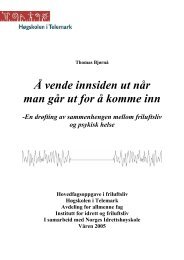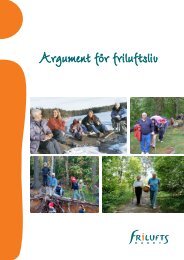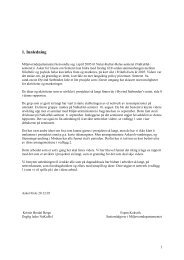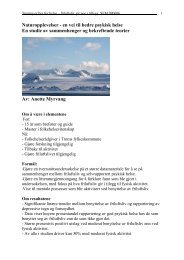Green Care: A Conceptual Framework - Frisk i naturen
Green Care: A Conceptual Framework - Frisk i naturen
Green Care: A Conceptual Framework - Frisk i naturen
Create successful ePaper yourself
Turn your PDF publications into a flip-book with our unique Google optimized e-Paper software.
that they judge themselves capable of managing. Perceived self-efficacy<br />
regulates human function in four major ways (Bandura, 1977):<br />
i) Cognitive: People with high self-efficacy are more likely to have high<br />
aspirations, think soundly, set themselves difficult challenges, and<br />
commit themselves firmly to meeting those challenges. They have<br />
a tendency to visualize successful outcomes instead of dwelling on<br />
personal deficiencies or ways that things might go wrong.<br />
ii) Motivational: Motivation and self-belief is stronger if people believe<br />
that they can attain their goals. Self-efficacy beliefs determine the goals<br />
people set for themselves, how much effort they expend, and how long<br />
they persevere.<br />
iii) Mood or affect: Self-efficacy beliefs regulate the motion states. People<br />
that lack self-efficacy are more likely to magnify risks, while people<br />
with high self-efficacy deal with stress and anxiety by acting in ways<br />
that make the environment less threatening. They are also more likely<br />
to calm themselves and seek support from other people. Likewise,<br />
persons with high coping abilities have better control over disturbing<br />
thoughts. There is also a connection between low self-efficacy and<br />
depression. Low self-efficacy causes the defeat of one’s hope, thus<br />
resulting in low mood. This in turn will lead to weakened self-efficacy<br />
and causes a downward cycle.<br />
People with low self-efficacy avoid difficult tasks, they lower their<br />
goals, and seek less support from others. Failures make them lose faith<br />
in themselves, and in turn contribute to lowered mood and depression<br />
(Bandura, 1982, 1986, 1997).<br />
Research has shown that therapeutic riding, for example, can improve selfconfidence,<br />
social competence and quality of life (Fitzpatrick and Tebay<br />
1997; Burgon, 2003; Bizub et al, 2003). However, there are to date few<br />
long-term follow-up studies of the impact of green care interventions on<br />
self-efficacy. A recent doctoral thesis based on a randomised, controlled<br />
study of a three-month intervention with dairy cattle for patients with<br />
severe mental health illness (mainly mood disorders, anxiety disorders,<br />
personality disorders, and schizophrenia), showed that anxiety was lower<br />
and self-efficacy higher at follow-up six months after the end of the<br />
intervention compared with baseline for the treatment group, but not for the<br />
85















